Also by Joan Bolker, Ed.D.
The Writers Home Companion:
An Anthology of the
Worlds Best Writing Advice,
from Keats to Kunitz
Writing Your Dissertation
in Fifteen Minutes a Day

JOAN BOLKER, Ed.D.

Writing Your Dissertation
in Fifteen Minutes a Day

A GUIDE TO STARTING,
REVISING, AND FINISHING
YOUR DOCTORAL THESIS

AN OWL BOOK
Henry Holt and CompanyNew York

Owl Books
Henry Holt and Company, LLC
Publishers since 1866
175 Fifth Avenue
New York, New York 10010
www.henryholt.com
An Owl Book and  are registered trademarks
are registered trademarks
of Henry Holt and Company, LLC.
Copyright 1998 by Joan Bolker
All rights reserved.
Distributed in Canada by H. B. Fenn and Company Ltd.
Library of Congress Cataloging-in-Publication Data
Bolker, Joan.
Writing your dissertation in fifteen minutes a day:
a guide to starting, revising, and finishing your doctoral thesis/
Joan Bolker. 1st ed.
p. cm.
An owl book.
Includes bibliographical references (p. ) and index.
ISBN-13: 978-0-8050-4891-9
ISBN-10: 0-8050-4891-X
1. Dissertations, AcademicAuthorship. 2. Report writing.
3. Academic writing. I. Title.
LB2369.B57 | 1998 |
808'.066378dc21 | 98-5262 |
Henry Holt books are available for special promotions and
premiums. For details contact: Director, Special Markets.
First Owl Books Edition 1998
Designed by Victoria Hartman
Printed in the United States of America
19 21 23 22 20 18
For EDB
Placet

Acknowledgments
MANY PEOPLE have contributed to the making of this book with support of many kinds: with practical help, suggestions of topics and ideas, their own words, editing, and teaching. I want to thank first the many graduate students who have worked on (and for the most part completed) their dissertations in my presence and taught me what was and wasnt helpful to them.
I am grateful to Irene Fairley and Carl Steinitz, not only for their interest in and support of this project, but also for suggesting and contributing to the appendix chapter on advice for advisors; Carl Steinitz also allowed me to include his description of how he writes; Rob Socolow made several helpful suggestions for that same chapter. Thanks to Susan Gubar and John Burt for good talk about graduate students and their struggles; Bob Kiely, for permitting me to tell the story of his dissertation; William Alfred, Peter Elbow, Albert Guerard, Kiyo Morimoto, William G. Perry Jr., and Ruth Whitman, for showing me much of what I know about first-rate teaching and writing; Jane Prager, for listening closely; Robin Straus, Theresa Burns, and Amy Rosenthal, for starting this book on its way; Maggie Carr, for careful and sensitive copyediting of the book; Robin Straus and Tracy Sherrod, for invaluable help in bringing it to completion; Susan Lorand, for fine editorial help; Peg Frank, Bonnie Glaser, Connie Lewis, Ellen Marks, Patsy Sharaf, and Anita Shishmanian, for their ongoing support; Pat and Margaret Kilcoyne, for Latin consultations and many other things; Anne-Marie Smith, for allowing me the privilege of watching her grow as a writer over half of her life so far, and for cheering my writing efforts.
Thanks to my daughter, Jessica Bolker, for her many suggestions and superb editorial help, and for the benefit of her thoughtful experience as a graduate student in zoology, which is woven into the fabric of this book; to my son, Ben Bolker, who edited, asked the right questions, contributed extensively to the appendix chapter on computers, and talked with me willingly, and at a moments notice, about both technical issues and the particular concerns of doctoral students in the sciences; and to Peter Bixby, who shared the process of his thesis writing with me, even in medias res, allowed me to use his description of his revising process, and meticulously edited the early chapters of this book.
Thanks to Vicky Steinitz, my own thesis advisor, who showed me how it was done at its best.
And finally, to Ethan Bolkerthe list is too long even to enumerate.

Introduction
FOR OVER THIRTY YEARS Ive listened to writers as theyve talked about their work. The hundreds of doctoral students among them whove consulted me in order to finish their dissertations have taught me how to help others to give themselves good writing advice. This book is a collection of successful field-tested strategies for writing a dissertation; its also a guide to conducting an experiment, with you as your own subject, your work habits as the data, and a writing method that fits you well as the goal. Writing Your Dissertation is for two audiences: its primary audience is the graduate student who is either about to begin or has already begun writing a dissertation, but thesis advisors will find it useful, too.
Ive worked hard on two dissertations of my own. The first was on medieval literature. It occupied me for four or five years, and I never completed it. I quit that Ph.D. program shortly after my committee had accepted my first chapter. I began writing my second dissertation, a study of the intersection of individual psychological development, curriculum development, and writing competence, about four years later and finished it in a few months. Clearly Id learned something in between. Ive learned more since. My own experiences as a writer, and what others have told me about what works for them (dividing up large tasks, setting themselves short-term deadlines) and what doesnt (writing binges, trying to write after a full days work) are distilled in this book so that you can learn from our struggles.
This is not just a writing book. It doesnt simply focus on the limited task of transcribing your research results into the required format. When I speak about writing your dissertation, I mean the entire event, from the first stirrings you note in yourself of a deep interest in a field, a research problem, or a theme, through the iterations of possible ideas, to a finished manuscript. Under the rubric of writing I include your research, the first hesitantly scribbled notes to yourself, the zero draft, the first draft, drafts that follow, and the final one, as well as the thesis defense and the transformation of your dissertation into published articles or a book.
You might ask, Why focus on the writing of a dissertation when the major problem is doing the research? Because to do research is to inquire, to dig ones way into a problem, and writing is one of the best tools available for such work. I will show you how to use writing to think, to explore, to blunder, to question yourself, to express frustration, to question further, to get to what feels like the truth of your subject. And to celebrate.
Next page

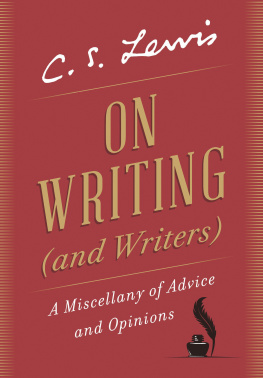
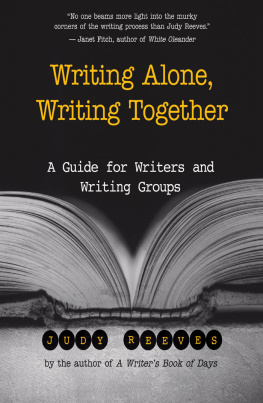
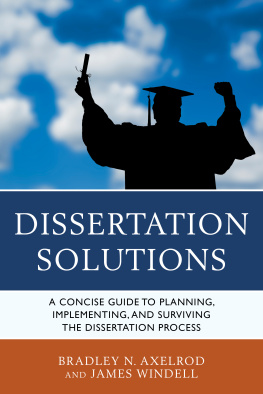
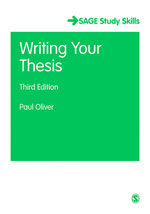
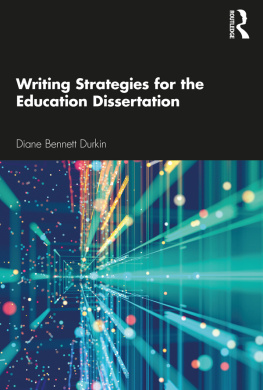
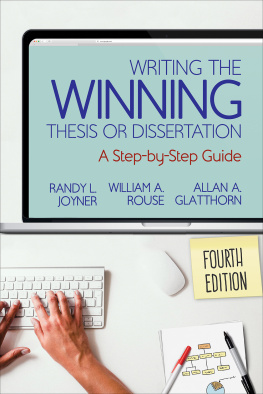
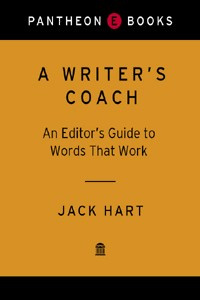
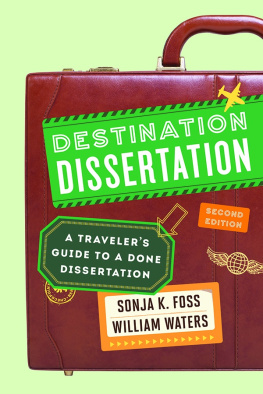




 are registered trademarks
are registered trademarks